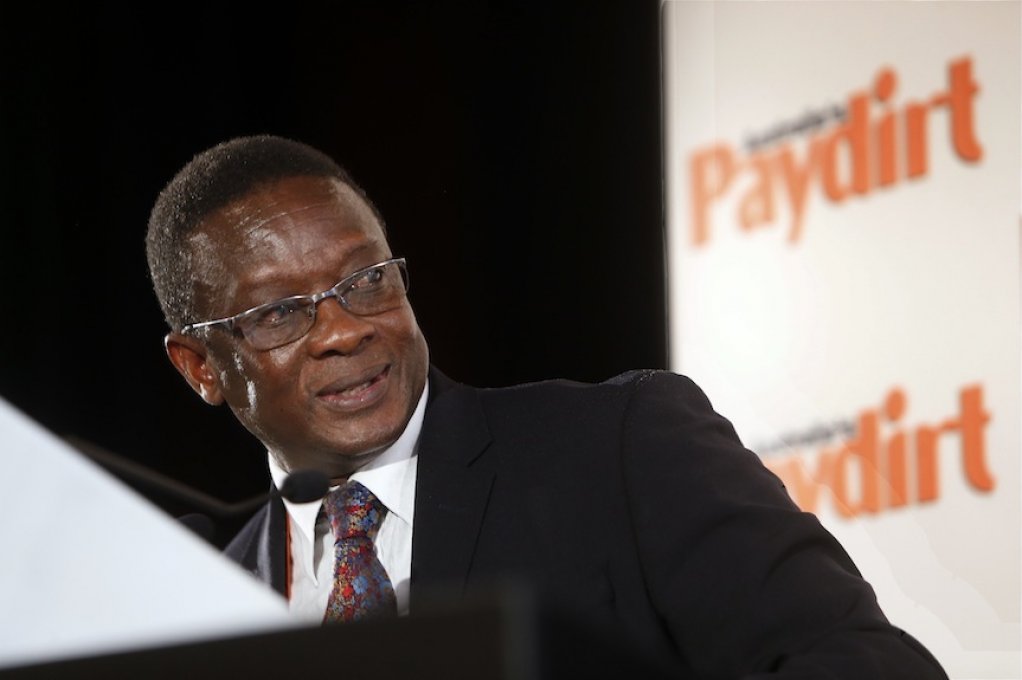
Deputy Minister Godfrey Oliphant
Photo by: Bryan Charlton/Paydirt Media
PERTH (miningweekly.com) – The South African government remained confident that recent legal challenges against ownership elements of the Mining Charter would not influence investment confidence in the country.
The Mining Charter called for a 26% black economic-empowerment (BEE) participation in South African mining projects by May 1, 2014.
In June, the Chamber of Mines (CoM) approached the South African High Court for a declaratory order to provide guidance over the once empowered, always empowered principle contained within the Mining Charter.
This followed after the Department of Minerals Resources (DMR), mining companies and labour unions, in March, agreed to work collaboratively to obtain a court ruling on the crucial issue of BEE ownership of mines.
The CoM’s concerns related to the DMR’s intention to exclude empowerment ownership transactions post-2004, where historically disadvantaged South Africans have sold their participation.
This exclusion was, according to the CoM, prejudicial to mining companies and undermined the sustainability of the sector.
Private law firm Malan Scholes Attorneys, subsequently, also launched legal challenges against the DMR, questioning the constitutionality of the Mining Charter as a whole and arguing that the charter was vague and contradictory.
“They are trying their luck,” Mineral Resources Deputy Minister Godfrey Oliphant said of the most recent legal development.
“We have always known that when we get to the point of implementation, there would be a lot of interest to test our resilience and determination,” he told Mining Weekly Online on the sidelines of the Africa Downunder conference, in Perth.
“When the Mineral and Petroleum Resources Development Act (MPRDA) was initially passed in 2002, we had a lot of discussions about the constitutionality of the Mining Charter and it took us 18 months to do so.
“The legal action is a red herring and they are trying to distract us, but we remain focused,” Oliphant said.
Regarding the CoM’s challenge, Oliphant said the DMR would oppose the legal action, but was hoping to do so “without too much bloodshed”.
“The law is clear; it says that, at any given time post-2014, companies must have a 26% BEE compliance. There is no ambiguity about it. I sense that those companies raising the issues are those who haven’t complied.”
In addition to the legal challenges about empowerment, the MPRDA Amendment Bill had yet to be passed through Parliament.
The Bill was referred back to Parliament by President Jacob Zuma in January, and has, to date, not shown any movement, adding to the regulatory uncertainty within the resources sector.
Webber Wentzel partner Peter Leon told Mining Weekly Online that the feeling of uncertainty was nothing new to South African miners.
“The South African mining industry has, unfortunately, suffered from regulatory uncertainty for some years now; it’s not new. The National Development Plan actually speaks about that, and a lot of other government documents such as the National Treasury’s Medium Term Strategic Framework also talk about the regulatory uncertainty in the mining industry that needs to be addressed by government.”
Leon added that while the government seemed to recognise the need for regulatory certainty in the mining sector, which is responsible for some 50% of the country’s total exports, the implementation of that commitment appeared difficult.
Further, the current electricity supply issues being experienced in South Africa were making investment in an electricity-hungry sector such as mining, equally difficult.
“The Eskom situation is something that the government will need to address, almost certainly through a public-private partnership or partial privatisation,” Leon said.
“You have a combination of globally declining commodity prices and problems with erratic supply from the electricity utility that government now recognises needs to be fixed urgently,” he stated.
However, despite the uncertainties facing the mining industry in South Africa, Oliphant remained convinced that investor confidence would not be shaken.
“Serious investors in South Africa will know exactly where we stand. There is no uncertainty about the law. There are amendments happening in Parliament, but that is a normal democratic process. The MPRDA is solid.”